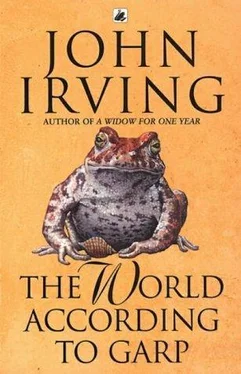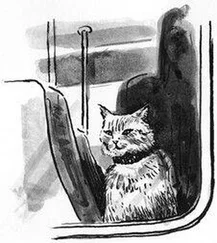And it is to the credit of the athletic director of the Steering School that Roberta was offered the position of offensive line coach for the Steering football team. But the former tight end politely refused the job. “All those young boys,” Roberta said sweetly. “I'd get in terrible trouble.”
Her favorite young boy, all her life, was Duncan Garp, whom she mothered and sistered and smothered with her perfume and her affection. Duncan loved her; he was one of the few male guests ever allowed at Dog's Head Harbor, although Roberta was angry with him and stopped inviting him for a period of almost two years—following Duncan's seduction of a young poet.
“His father's son,” Helen said. “He's charming.”
“The boy is too charming,” Roberta told Helen. “And that poet was not stable. She was also far too old for him.”
“You sound jealous, Roberta,” Helen said.
“It was a violation of trust ,” Roberta said loudly. Helen agreed that it was. Duncan apologized. Even the poet apologized.
“ I seduced him ,” she told Roberta.
“No you didn't,” Roberta said. “You couldn't .”
All was forgiven one spring in New York when Roberta surprised Duncan with a dinner invitation. “I'm bringing this smashing girl, just for you—a friend,” Roberta told him, “so wash the paint off your hands, and wash your hair and look nice. I've told her you're nice, and I know you can be. I think you'll like her.”
Thus having set Duncan up with a date, who was a woman of her choice, Roberta felt somehow better. Over a long period it came out that Roberta had hated the poet whom Duncan had slept with, and that was the worst of the problem.
When Duncan crashed his motorcycle within a mile of a Vermont hospital, Roberta was the first to get there; she had been skiing farther north; Helen had called her, and Roberta beat Helen to the hospital.
“Riding a motorcycle in the snow!” Roberta roared. “What would your father say?” Duncan could barely whisper. Every limb appeared in traction; there was a complication involving a kidney, and unknown to both Duncan and Roberta—at the time—one of his arms would have to come off.
Helen and Roberta and Duncan's sister, Jenny Garp, waited for three days until Duncan was out of danger. Ellen James was too shaken to come wait with them. Roberta railed the whole time.
“What should he be on a motorcycle for—with only one eye? What kind of peripheral vision is that? ” Roberta asked. “One side is always blind.”
That had been what had happened, exactly. A drunk had run a stoplight and Duncan had seen the car too late; when he'd tried to outmaneuver the car, the snow had locked him in place and held him, an almost motionless target, for the drunken driver.
Everything had been broken.
“He is too much like his father,” Helen mourned. But, Captain Energy knew, in some ways Duncan was not like his father. Duncan lacked direction , in Roberta's opinion.
When Duncan was out of danger, Roberta broke down in front of him.
“If you get killed before I die, you little son of a bitch,” she cried, “it will kill me! And your mother, probably—and Ellen, possibly—but you can be sure about me. It will absolutely kill me, Duncan, you little bastard!” Roberta wept and wept, and Duncan wept, too, because he knew it was true: Roberta loved him and was terribly vulnerable, in that way, to whatever happened to him.
Jenny Garp, who was only a freshman at college, dropped out of school so that she could stay in Vermont with Duncan while Duncan got well. Jenny had graduated from the Steering School with the highest honors; she would have no trouble returning to college when Duncan recovered. She volunteered her help to the hospital as a nurse's aide, and she was a great source of optimism for Duncan, who had a long and painful convalescence ahead of him. Duncan, of course, had some experience with convalescence.
Helen came from Steering to see him every weekend; Roberta went to New York to look after the deplorable state of Duncan's live-in studio. Duncan was afraid that all his paintings and photographs, and his stereo, would be stolen.
When Roberta first went to Duncan's studio-apartment, she found a lank, willowy girl living there, wearing Duncan's clothes, all splattered with paint; the girl was not doing such a hot job with the dishes.
“Move out, honey,” Roberta said, letting herself in with Duncan's key. “Duncan's back in the bosom of his family.”
“Who are you?” the girl asked Roberta. “His mother?”
“His wife , sweetheart,” Roberta said. “I've always gone for younger men.”
“His wife? ” the girl said, gawking at Roberta. “I didn't know he was married.”
“His kids are coming up in the elevator,” Roberta told the girl, “so you better use the stairs. His kids are practically as big as me.”
“His kids? ” the girl said; she fled.
Roberta had the studio cleaned and invited a young woman she knew to move in and watch after the place; the woman had just undergone a sexual transformation and she needed to match her new identity with a new place to live. “It will be perfect for you,” Roberta told the new woman. “A luscious young man owns it, but he'll be away for months. You can take care of his things, and have dreams about him, and I'll let you know when you have to move out.”
In Vermont, Roberta told Duncan, “I hope you clean up your life. Stop the motorcycles and the mess—and stop the girls who don't know the first thing about you. My God: sleeping with strangers. You're not your father yet; you haven't gotten down to work . If you were really being an artist, Duncan, you wouldn't have time for all the other shit. All the self-destruction shit, particularly.”
Captain Energy was the only one who could talk to Duncan that way—now that Garp was gone. Helen could not criticize him. Helen was too happy just to have Duncan alive, and Jenny was ten years younger than Duncan; all she could do was look up to him, and love him, and be there while he took so long to heal. Ellen James, who loved Duncan fiercely and possessively, became so exasperated with him that she would throw her note pad and her pencil in the air; and then, of course, she had nothing to say.
“A one-eyed, one-armed painter,” Duncan complained. “Oh boy.”
“Be happy you've still got one head and one heart,” Roberta told him. “Do you know many painters who hold the brush in both hands? You need two eyes to drive a motorcycle, dummy, but only one to paint.”
Jenny Garp, who loved her brother as if he were her brother and her father—because she had been too young to know her father, really—wrote Duncan a poem while he recuperated in the hospital. It was the first and only poem young Jenny Garp ever wrote; she did not have the artistic inclination of her father and her brother. And only God knows what inclination Walt might have had.
Here lies the firstborn, lean and long,
with one arm handy and one arm gone,
with one eye lit and one gone out,
with family memories, clout by clout.
This mother's son must keep intact
the remains of the house that Garp built.
It was a lousy poem, of course, but Duncan loved it.
“I'll keep myself intact,” he promised Jenny.
The young transsexual, whom Roberta had placed in Duncan's studio-apartment, sent Duncan get-well postcards from New York.
The plants are doing okay, but the big yellow painting by the fireplace was warping—I don't think it was stretched properly—so I took it down and leaned it with the others in the pantry, where it's colder. I love the blue painting, and the drawings—all the drawings! And the one Roberta tells me is a self-portrait, of you—I love that especially.
Читать дальше












